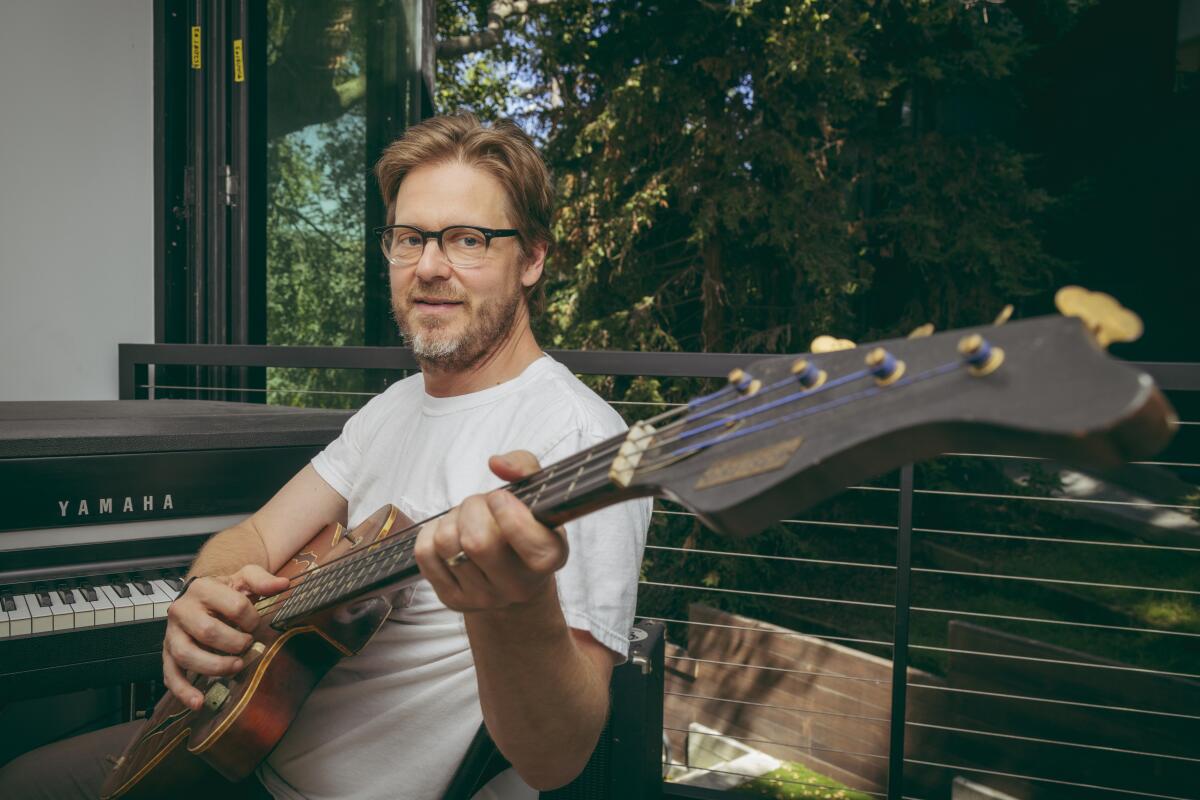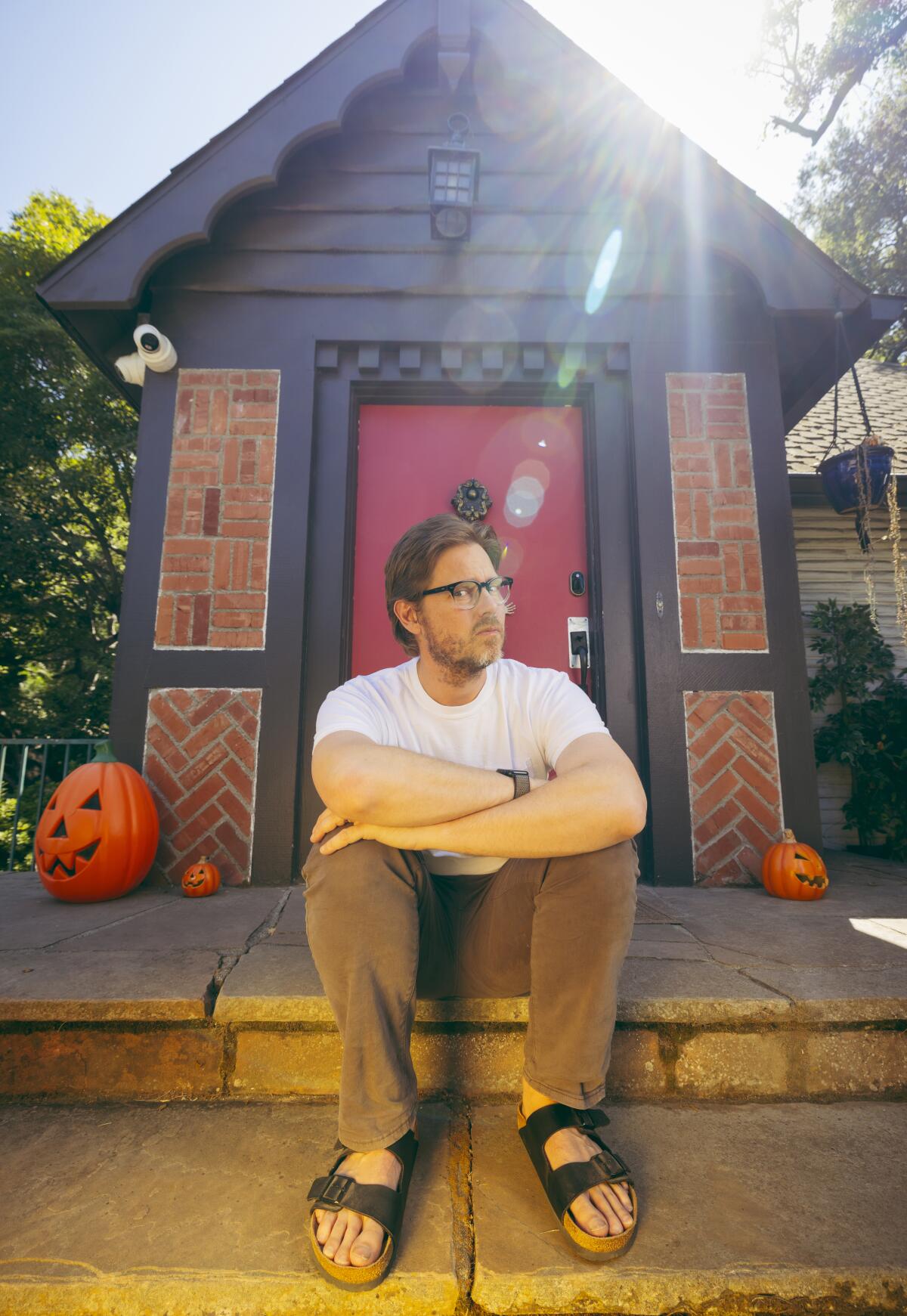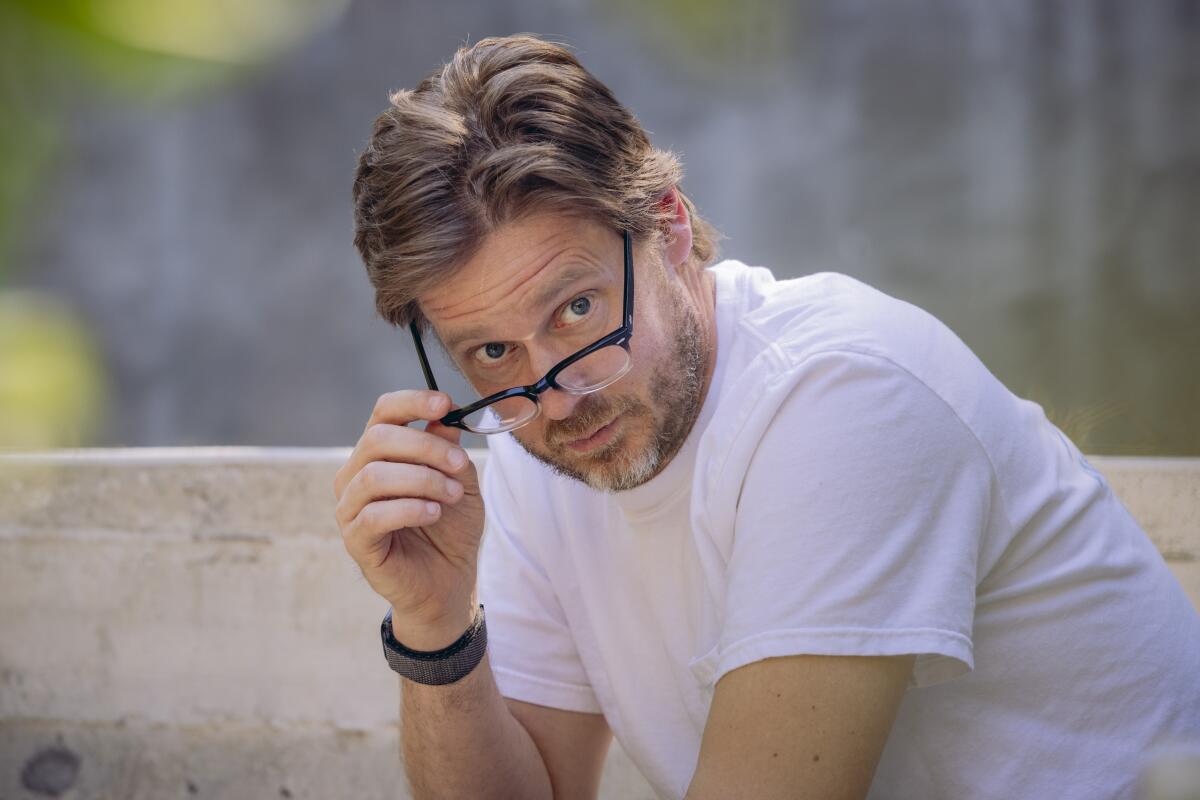Tim Heidecker blends his singer-songwriter take on the world with his funny guy routine

Who is Tim Heidecker, really? Even for fans of his comedy, sometimes it’s hard to know. As a master of his own entertainment universe for the last 20-plus years, the multi-hyphenate who made a splash as the co-creator of “Tim and Eric Awesome Show, Great Job!” on Adult Swim is someone whose humor comes from inhabiting different personas over the years. He’s made a career of crafting absurd new worlds that often bear little resemblance to his day-to-day life as a chilled-out, hyper-literate, baseball-watching suburban dad.
At least that’s the side of him that comes out during a recent interview in his home recording studio in the serene, tree-covered hills of Glendale, where he often hides away to write songs that are more introspective than hilarious or film episodes of his weekly, call-in talk show “Office Hours.” In taking time to record his new album, “Slipping Away,” out on Friday, his real life comes more into focus, even as he writes a deceptively complex mix of warm folk songs about fatherhood and others that showcase dystopian tales of post-apocalyptic dread.
Together with his touring band — Eliana Athayde on bass and vocals; Josh Adams on drums; Vic Berger on keys; and Connor “Catfish” Gallaher on guitar and pedal steel — Heidecker has created his most ambitious album to date. “Slipping Away” thrives on short, sonic vignettes that create a vibe that moves from lighthearted road music to darker existential jams that somehow end up feeling hopeful. Recently we spoke to Heidecker about having fun with his identity as a singer-songwriter. The conversation has been edited for length and clarity.
World-building is a big element in your comedy — creating characters and plot lines in a show like “Tim and Eric Awesome Show, Great Job!” as well as in your stand-up or mockumentaries like “Mister America.” How does your approach to world-building in music differ from comedy?
It’s certainly different. I’m in the middle of building a new world, I guess, and there’s continuity with the kind of songs I write and the style that they sound like, or the arrangements and the production style. There’s definitely a through line from record to record — themes are similar, the players are similar. With any universe or world, there’s the people in them, and that’s becoming consistent. In my little group of collaborators there’s some sort of famous people in that group that have worked on my records, like Natalie [Laura Mering] from Weyes Blood, Jonathan Rado and Kurt Vile, Mac DeMarco and now with my current band, their personalities are starting to emerge, and people are hopefully becoming fans of them. I dress a certain way in the music world; it’s a little closer to how I actually dress. But whenever you go onstage, you’re considering how you’re going to look, how it’s going to look on film, or when people shoot pictures of you. So I’m inhabiting like a persona, for sure, but it’s a little more grounded, a little closer to myself.
In the music video for “Wells Running Dry,” which was shot in the recording studio where you made the album, what was your goal in showing a behind-the -scenes look at how you make music with your band?
I’m a fan of seeing processes, I’m a fan of seeing how things come to be. I could watch hours of studio footage. It’s something you don’t always get to see. Sometimes it’s very boring, and sometimes you have to shoot for a long time to find something worthwhile. But in that video in particular, I wanted to show how collaborative and how much love there is between all of us. There’s a perception of me through some of my projects and some of my online presence, my Twitter humor, my stand-up character, that that might be who I am. But I think that through the music, it’s a chance to see I’m pretty affable and down to earth and enjoy other people. And I’ve been doing [music] with those people for so long that I must be pretty tolerable to be around.

What inspired the title of the album “Slipping Away?”
Titles are a tricky business to deal with. I’m a big fan of records, obviously, and the little tricks that show up over time. There’s a record or two where the title of the record isn’t a title of the song, but it’s a line from one of the songs. So “slipping away” is a line in the song “Tripping.” To me, it had two meanings — one is a positive, of letting go, being open, tripping, losing yourself. And then the dark side of it, the second side is that it’s all slipping away, it’s all falling apart. OK, so I like where it has a Side A meaning and a Side B meaning.
I also think that the album cover has a dual meaning too. It’s a photo of the [recording studio] control room with an empty chair. And there’s two meanings in that for me, which is like, come on in and sit down and listen to my record. And the other side of that is, no one’s here, everyone’s gone.

There are also two parts of the album as a whole that make an arch that touches on how good fortune can go up and also come down just as fast in life because of chaos or unexpected events. Did you write one chunk of the songs first and then the others came later? How did the story arc of the album develop?
The writing for this record was definitely coming out of the pandemic and felt like we got a taste of what you might have seen in a disaster movie. There were moments in our lives that felt like, oh, s—, we’re raiding the grocery store for toilet paper. So some of the songs I was writing were sort of very literal short story format kind of songs, character studies, about people living in a world where things had collapsed. So it was really coming out of just that being in the air. But that’s really heavy, and I didn’t want the whole album to be saddled with that. And I think all good concept records always have stray [songs] because they’re not musicals or rock operas. So the other things that were going on in my life were that I just launched this new project, which was the band. And I was having kind of new good experiences, but I was also feeling reflective of my place in the world, and approaching 50. So the first half of the record is a little more domestic and a little more reflective. And then I think I love the surprise of Side B becoming very heavy and very dystopian and abstract and not very personal. I mean, it’s personal in the sense that it’s like, these are fears, anxieties and nightmares I think everyone can relate to. But these aren’t things that have been happening to me.

You added a light touch at the end of the last song, “Bells Are Ringing,” with your daughter Millie singing the outro. It added a much-needed palate cleanser sort of moment. How did that decision come about?
It came out because I felt that [the song] was too heavy. I’m in control of what I’m putting out; it doesn’t have to exist. It exists because I’m making it, and I can say whatever I want. So I definitely felt this big, beautiful ending to the record. And lyrically, all I was saying is that it’s over and things are going to hell and everything dies eventually. And I was like, ‘Well, that’s kind of a cop-out to just end on that, you know, it’s not that interesting. It’s not that profound.’ So I had that little line [“But underground, maybe there’s love growing, not a lot but it’s all we have. It might just be enough.”]. It was too raw for me to sing, too vulnerable, I guess. And I just heard the sound of a kid singing, and Millie can sing and I just thought it’s a fun thing to do together. It was pretty, Not a lot of thought went into it, except, when I put it in there, I was paranoid that it was a bad idea. But when I was playing it for friends, everybody reassured me that it was very endearing and cute, yeah, that it was, you know, it’s trying to avoid the cringe, as we always do.

Have you always played and recorded your own music or did you start playing after you got into comedy?
I always had bands going back to high school. I had aspirations to play music since I was a kid and put it on the back burner for a long time when the comedy was really potent and when Eric [Wareheim] and I were just swamped with making [“Tim and Eric Awesome Show, Great Job!”] and then making another TV show. But even through those periods, there’s so much music in those shows that I was always able to have a guitar around, sit at a keyboard and plunk out some songs for the show. But with the birth of my daughter, which is now 11 years ago, and moving into my house, gave me something to write about that I didn’t have before. Something that wasn’t ironic, it wasn’t satirical, it wasn’t a parody of something. It was like, “Oh, I’m a dad and I’m living in the suburbs.” And, you know, “This is kind of an interesting new phase and maybe somebody would relate to this experience.”

Have you thought how you might blend the comedy and the music worlds on tour for this album or in the near future?
I think even on this tour and on the last tour I just did opening for Waxahatchee, my survival instinct, my animal instinct, is always kind of to be funny. That’s gonna be the thread through the whole show. Yes, there’s songs that are not funny at all, but I’m gonna be funny before and after and during [the show]. Some songs are funny, and I find it really like the character work I do, like with stand-up is very funny and fun, but it’s pretty, narrow, like I’m in a character mode. When I’m just me onstage with the band, I can do all kinds of things that are funny, closer to how I behave on [my podcast] “Office Hours.” I take very seriously the idea of putting a good show together and that means it’s going to be dynamic. There’s going to be some rockin’ stuff, there’s going to be some sad stuff, there’s gonna be some funny stuff. I’m not a fan of going to see a band that just plays their songs and gets out of there. I want it to be like an interactive, dynamic, funny, but also, you know, moving evening for everybody.
More to Read
The biggest entertainment stories
Get our big stories about Hollywood, film, television, music, arts, culture and more right in your inbox as soon as they publish.
You may occasionally receive promotional content from the Los Angeles Times.












